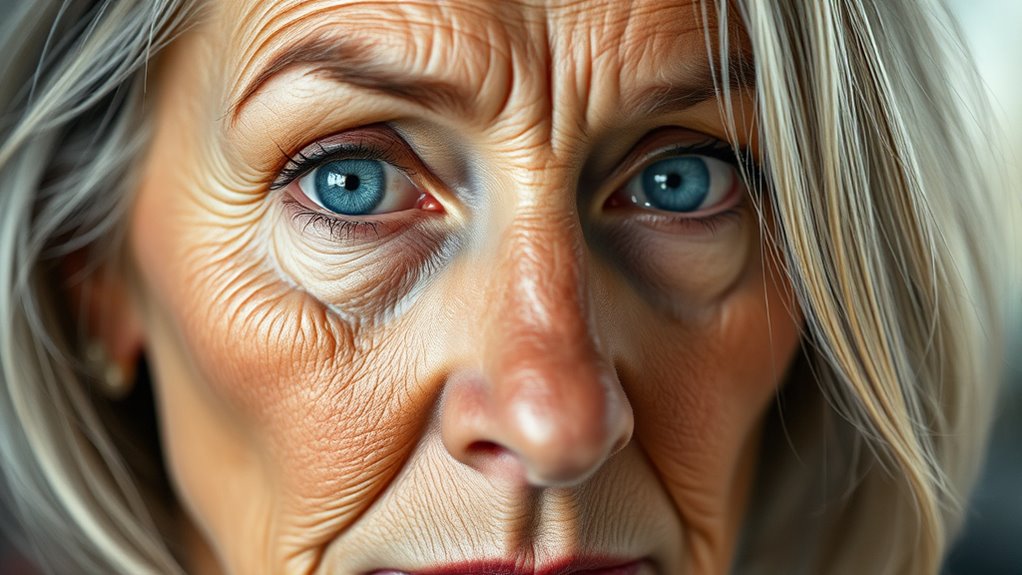As a female narcissist ages, her fading looks threaten her need for admiration, prompting her to adopt subtle dominance, superficial social tactics, and defensive behaviors to preserve her self-esteem. She may cling to nostalgia, seek validation through achievements, or engage in age-defying rituals. Social withdrawal and superficial relationships often increase, leading to loneliness and emotional struggles. If you want to understand how these dynamics unfold and impact her behavior, explore further to uncover the full picture.
Key Takeaways
- Physical aging threatens the female narcissist’s need for admiration, prompting shifts toward internal coping and superficial social ties.
- She may resort to nostalgia and boastfulness to reinforce self-worth amid declining appearance and external validation.
- Social interactions become more superficial and self-centered, with increased withdrawal to protect fragile ego and avoid criticism.
- Defensive strategies include cosmetic procedures, curating youthful personas, and emphasizing achievements over appearance.
- Emotional vulnerability and loneliness often increase as aging challenges her self-image, leading to more subtle dominance and social distancing.
The Impact of Physical Decline on Self-Image and Narcissistic Traits

As women age and experience physical decline, their self-image often suffers, particularly for those with narcissistic traits who have long depended on appearance as a key source of self-worth. You may find it harder to rely on your looks as a measure of value, leading to internal struggles. Shifting societal beauty standards make it difficult to adapt your self-image, increasing stress as you see discrepancies between your idealized self and reality. This discomfort can cause social withdrawal, especially in unfamiliar situations where you feel exposed or judged. As your physical appearance changes, feelings of isolation may grow, and you might become more withdrawn to avoid confronting these uncomfortable truths. The decline challenges your core self-perception, threatening your sense of control and intensifying feelings of vulnerability. Research shows that narcissism tends to decrease with age, which can further impact self-esteem during these transitions. Recognizing the importance of skincare routines and maintaining skin health can help foster a sense of self-care and reassurance during these challenging times.
Behavioral Shifts as External Validation Diminishes

When external validation from physical appearance wanes, your behavior often shifts in response. As your attractiveness declines, reliance on looks diminishes, prompting you to seek validation elsewhere, like career success or material wealth. You might focus more on achievements or adopt caregiving roles to rebuild your ego. You may also develop new emotional intelligence skills to foster deeper connections, compensating for the loss of superficial admiration. Social withdrawal becomes common in environments where admiration feels unreachable. Manipulative tactics, such as guilt-tripping, may replace vanity-driven validation-seeking. Leadership roles can help sustain your sense of importance, especially if they provide a platform for authority. Over time, you may lower expectations of praise from partners or peers, adjusting your relationship strategies. These changes reflect a move from superficial validation toward more internal, role-based sources of self-worth, as you adapt to diminished external admiration. Additionally, engaging in aquatic exercise can serve as a healthy outlet for stress and self-improvement, helping to redefine self-esteem beyond superficial appearances. Understanding the filter technology used in air purifiers can also assist in selecting effective tools for creating a healthier environment as part of self-care routines.
Emotional and Psychological Reactions to Aging and Loss

Aging often challenges your self-identity by threatening the qualities you’ve long associated with youth and beauty. You may feel shame or become defensive as wrinkles, loss of muscle tone, and other physical changes threaten your self-image. With external validation fading, your self-worth erodes, making you more vulnerable emotionally. You might resist acknowledging your limitations, leading to self-consciousness and social withdrawal. The pressure to maintain an inflated self-image intensifies emotional distress as youthful traits decline. Internalized feelings of inadequacy can heighten sensitivity to criticism or diminished admiration. To cling to your identity, you might engage in cosmetic procedures, deny physical decline, or idealize past youth. These reactions often cause interpersonal strain, loneliness, and a desperate need for control, feeding a cycle of emotional turmoil. Recognizing the role of electric bikes and power sources in your lifestyle can sometimes serve as a metaphor for seeking sustainable ways to adapt and find new sources of strength during these transitions. Additionally, understanding how color accuracy and contrast ratio affect visual perception can remind you of the importance of genuine self-acceptance over superficial appearances. Exploring dog names that reflect your evolving identity may also offer a comforting connection to your personal journey. Furthermore, incorporating sound design principles, such as creating authentic auditory experiences, can serve as a metaphor for embracing genuine self-awareness rather than superficial appearances.
Coping Strategies and Their Effectiveness in Late Life

In late life, narcissistic individuals often develop various coping strategies to preserve their self-image despite physical and social changes. You might shift from relying on looks to emphasizing achievements like intellect, success, or social status. You could seek admiration through mentoring, community roles, or online personas that highlight other qualities, such as wisdom or power. Grandiose self-talk and internal narratives of superiority help counteract external validation loss. You may flaunt material possessions or social connections to substitute for fading physical appeal, focusing only on relationships that reinforce your sense of uniqueness. Additionally, you might engage in age-defiance rituals like cosmetic procedures or curate youthful personas online. These tactics serve to maintain a sense of control, even if they mask underlying insecurities about aging. Research shows that narcissism often declines with age, yet individual differences tend to remain stable over time, which may influence how effectively these coping strategies work for different people. Recognizing the importance of self-perception can help understand why these strategies are so vital to maintaining self-esteem during aging. Moreover, understanding the personality traits associated with narcissism can provide insights into the persistence of these behaviors despite aging challenges. The use of defense mechanisms allows narcissistic individuals to protect their fragile self-esteem from the impact of aging-related changes.
Furthermore, some individuals may develop age-related cognitive changes that influence their behaviors and coping mechanisms over time.
Navigating Social Relationships and Isolation in Later Years

As narcissists grow older, their relationships often become strained, leading to increased social isolation and difficulty maintaining meaningful connections. You may notice them resisting help, viewing it as a threat to their self-image, and manipulating family through guilt or finances. As independence fades, their entitled behavior worsens, fueling conflicts with caregivers and loved ones. Socially, they tend to withdraw, alienating friends and acquaintances through self-centered actions, which deepens their loneliness and may cause depression. They often prioritize weak ties over close relationships, seeking fleeting validation rather than emotional support. When their physical appeal diminishes, they struggle to attract attention, resorting to nostalgic boasting or subtle dominance. Their interactions remain superficial, dominated by conversations where they control the narrative, further isolating themselves and exacerbating their emotional struggles. Research indicates that social withdrawal in older narcissists is often a strategy to preserve their fragile self-image and avoid perceived threats to their ego.
Frequently Asked Questions
How Does Hormonal Change Influence Narcissistic Behaviors in Aging Women?
Hormonal changes in aging women, like declining estrogen during menopause, markedly influence narcissistic behaviors. You might notice increased emotional vulnerability, insecurity, and a desire to cling to youth and beauty. As hormonal shifts affect self-perception, you could become more anxious, withdraw socially, or seek extreme measures like plastic surgery. These changes can heighten feelings of inadequacy, making it harder to maintain the confidence and admiration that once fueled your narcissistic traits.
Are There Cultural Differences in How Aging Female Narcissists Cope With Appearance Loss?
Have you ever wondered why some women handle aging differently? Cultural differences shape how you cope with appearance loss. In Western societies, you might rely on cosmetic procedures or social media to maintain your image, while in other cultures, you could focus on traditional roles or community status. These approaches reflect deep-seated values, influencing whether you see aging as a personal failure or a natural progression.
Can Early Life Trauma Predict Narcissistic Responses to Aging in Women?
Your early life trauma can indeed predict how women respond to aging narcissistically. If you experienced neglect or emotional abuse, you might develop deep insecurities, leading to heightened efforts to cling to youth and beauty. These childhood wounds make you more prone to denial, envy, or hostility as your appearance changes. Trauma shapes your self-esteem, often fueling defensive, manipulative behaviors when faced with aging’s inevitable reminders of mortality and loss.
What Role Do Close Family Members Play in Managing Narcissistic Tendencies Later in Life?
You might notice that close family members often become central in managing a narcissist’s tendencies as she ages. They’re usually the primary sources of validation, manipulated through guilt or demands. By setting boundaries, you can protect your mental health, but it’s challenging since she may see this as betrayal. Your role is balancing compassion with firmness, recognizing her need for control while safeguarding your well-being.
How Do Healthcare Providers Address Narcissistic Behaviors During Aging Treatments?
You address narcissistic behaviors during aging treatments by establishing clear boundaries and using non-confrontational communication. You validate valid concerns without reinforcing entitlement, document interactions objectively, and employ therapeutic strategies like cognitive restructuring and emotion regulation techniques. You work collaboratively with mental health specialists, educate family members, and guarantee consistency in care. Prioritizing caregiver self-care and maintaining a patient-centered approach helps manage manipulation and reduces emotional exhaustion.
Conclusion
As you age, you might notice your self-worth heavily tied to your appearance. If your looks fade, it’s natural to feel lost or defensive, like Lisa, who struggled with her diminishing beauty and became increasingly manipulative to seek validation. Remember, true confidence comes from within, not just external praise. Embracing your evolving self can lead to deeper connections and inner peace, proving that genuine worth isn’t about looks but your resilience and authenticity.










